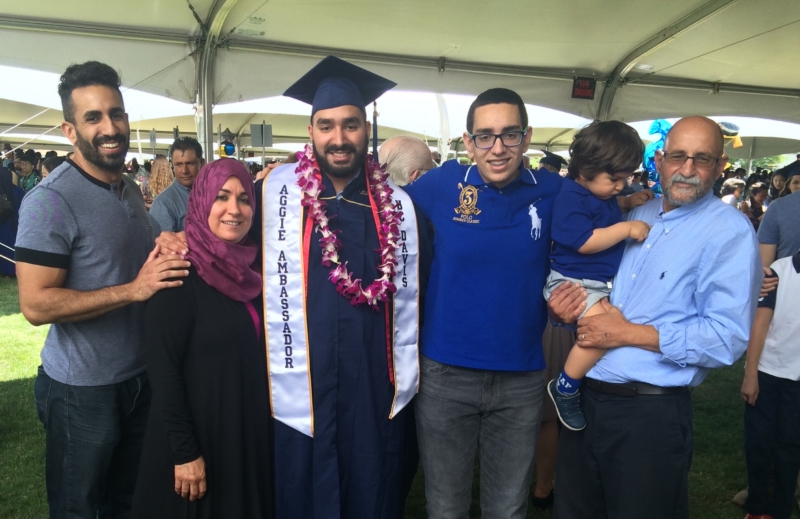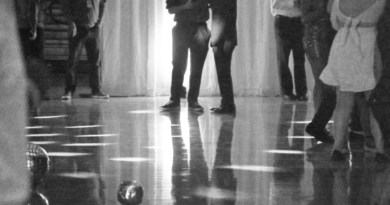Q&A: Ali Buzayan

Senior Ali Buzayan was born in the United States; however, his religion, Islam, and nationality, Libyan, made him a target of President Donald Trump’s executive order on immigration.
Q: How do you feel about the executive order?
A: It’s what he said he’d do…to an extreme. It’s discriminating, grouping so many nationalities based on religion and nothing else. It’s also a big misunderstanding and misinterpretation of what Islam is. Islam is a religion of peace, and he doesn’t really get that.
Q: How do you feel being a Muslim in this political climate?
A: In a place like Davis, it’s fine. But I know there are lots of people outside of Davis, especially in southern states, that feel discriminated against. Even in places like Canada, there was a shooting at a mosque. Things like that are maybe not Trump’s fault directly, but obviously connected to him and his ideas.
Q: Can you tell me a little bit about your background?
A: I was born in the U.S., and I’ve been in Davis my whole life. I’ve been to Libya multiple times and it’s an uncivil place but banning immigration from a place like Libya will do nothing but make their problems worse.
Q: Do you have family in Libya?
A: The only family I have in the US is my direct family: sister, two brothers and parents. The rest of my family is [in Libya]. It’s made things a lot harder. One of my cousins has a problem with his eye, and before, he would have to come to the US every few years to get checked up. But now, he can’t do that, and he can’t get the proper medical attention he needs. One of his eyes doesn’t work properly. He has a glass eye, and he has to get that changed every few years, so his eye socket continues to grow. He can’t do that anywhere else. Now he can’t come. He’s not a citizen. He has to get a visa every time.
Q: Did you see the executive order coming?
A: Not to this extent. I expected some strict immigration policies, but an outright ban? That was a bit of an extreme.
Q: How is Libya different from the United States?
A: There was a revolution. Since then, the country has been pretty unstable. Police and any infrastructure we take for granted isn’t really there. There’s no public schools hosted entirely by the government. A lot of them are international schools hosted by other countries. There isn’t really a police force. It varies from city to city. People set up their own police. Really high crime rates.
Q: What are the lasting effects of the ban?
A: The lasting effects are going to be beneficial as something to look back on like what not to do. Overall, there are probably things that are time sensitive for people that got messed up by the whole ban. Definitely probably had emotional effects on a lot of people. For the most part, I think we should take this as something to learn from rather than something to be upset with.
Q: Have you ever been discriminated against personally?
A: My family and I, whenever we travel, we get stopped at the airport a lot. My mom and my sister both wear hijabs, and that obviously puts a target on their head quite literally once they go into the airport. Going through security or something, we’ll get stopped for “random questioning.”
Q: Did your parents come here from Libya?
A: My dad came during the 80s. My dad left because the Gaddafi regime tried to draft him into the military. So he escaped from that. He met my mom through a family friend, and she moved to the US with him.
Q: How would you describe Islam in a sentence or two?
A: What I’d want people to know is that Islam is definitely a peaceful religion. All that ISIS stuff you see is extreme exaggeration and misinterpretation of what Islam is. That could just be easily done with in any other religion. Definitely peace is an important part of the religion to me. It’s really similar to Christianity and Judaism too, other really popular religions. Lots of parallels between the two.
Q: If you were in a room with Donald Trump, what would you say to him about the ban?
A: That’s a hard question. I’d tell him I respect his intentions but [he] definitely took the wrong actions. I don’t doubt that he is trying to put an end to terrorism and keep the American people safe. I respect that. His efforts and actual actions towards doing that are definitely not what he should be doing.
Q: Do you think you’ll ever be able to visit Libya again?
A: Oh yeah. Eventually there’s going to be some legislation to revoke this. It’s pretty extreme. Even if it is in four years when Trump is out and possibly a new president is here, then some action will be taken. There’s no doubt in my mind; I’ll go back to Libya. I’d be willing to go today even, but someone like my mom who immigrated to become a citizen, or my brother-in-law who has a green card…they’re afraid to leave the country at all.
Q: Is there anything else that you want people to know about the immigration order?
A: Don’t do anything too extreme. All these peaceful protests are good ideas, but don’t do anything you’d regret. Think through everything you do. This is all temporary. I highly doubt any of this is going to be long lasting.



